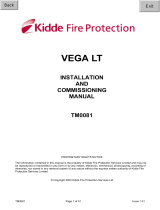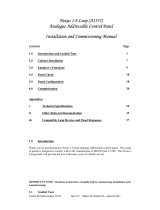Page is loading ...

2
54
6 8
9
Do not over tighten screws
Note the alignment marks
The 8th segment must be in set to ‘0’
for Discovery / XP95 operation
Do not over tighten screws
10
Addressing
XP95 / Discovery Systems Soteria CoreProtocol Systems
Segment
1
Sets the address Sets the address
2
3
4
5
6
7
8Set to ‘0’ (Fault value is returned if set
to ‘1’)
MCP Priority interrupt - enables MCP
behaviour
Enables priority enabled switch mon-
itor behaviour
DLY Enables 30 second delay into alarm Enables 30 second delay into alarm
Note:
On mixed systems, addresses 127 and 128 are reserved. Refer to system’s panel
manufacturer for further information.
See Table 1
3
39215-265/Issue 1
Remove knockouts and t glands
where required.
1
Drill holes where required.
7
Soteria Switch Monitor Unit
Installation Guide
Item No Part No Product Description
4110-1104 SA4700-100AMP Soteria Switch Monitor Unit
Technical Information
All data is supplied subject to change without notice. Speci cations are typical at 24V,
25°C and 50% RH unless otherwise stated.
Supply Voltage
Quiescent Current
Power-up Surge Current
LED Current
Maximum Loop Current
(Icmax; L1 in/out)
Operating Temperature
Humidity
Approvals
17-35V dc
500µA
900µA
1.6mA per LED
1A
–40°C to 70°C
0% to 95% RH
(no condensation or icing)
EN 54-17 & EN 54-18
For additional technical information please refer to data sheet PDS4110-1104
which is available on request.
Installation
All CI tests must be completed
before connecting the interface.
For connectivity see Figs 1, 2 & 3
Table 1

LED Status Indicator
Commissioning
The installation must conform to BS5839–1 (or applicable local codes).
Maintainence
Removal of the external cover must be carried out using a at screwdriver
or similar tool.
Caution!
Unit damage. No electrical supply greater than 50V ac rms or 75V dc
should be connected to any terminal of this Switch Monitor Unit.
Troubleshooting
Before investigating individual units for faults, it is important to check that
the system wiring is fault free. Earth faults on data loops or interface zone
wiring may cause communication errors. Many fault conditions are the
result of simple wiring errors. Check all connections to the unit.
Problem Possible Cause
No response or missing Incorrect address setting
Incorrect loop wiring
Fault condition reported Incorrect input wiring
Incorrect end-of-line resistor tted
Analogue value unstable Dual address
Loop data fault, data corruption
Constant alarm or pre-alarm Incorrect wiring
Incorrect end-of-line resistor tted
Isolator LED on Short-circuit on loop wiring
Wiring reverse polarity
Too many devices between isolators
POLL/
ISO
Flashing Green Device Polled
Continuous Yellow Isolator Active
IP Continuous Red Input Active
Continuous Yellow Input Fault
Fig. 1 Standard resistive monitoring mode
Fig. 2 Normally open monitoring mode (compatible with Soteria CoreProtocol Systems only)
Fig. 3 Normally closed monitoring mode (Compatible with Soteria CoreProtocol Systems only)
Note:
Not all LEDs can
be on simultane-
ously.
Connectivity ExamplesAddress Setting Examples
Mode Description
1 DIL Switch XP mode
2 Switch Monitor - normal resistance bands with alarm delays
3 Priority Switch Monitor - normal resistance bands
4 Switch Monitor - N/C input with alarm delays
5 Priority Switch Monitor - N/C input
Mode Table*
*Soteria CoreProtocol enabled systems only
Ampac
7 Ledgar Road, Balcatta, Western Australia 6021
www.ampac.net
/


